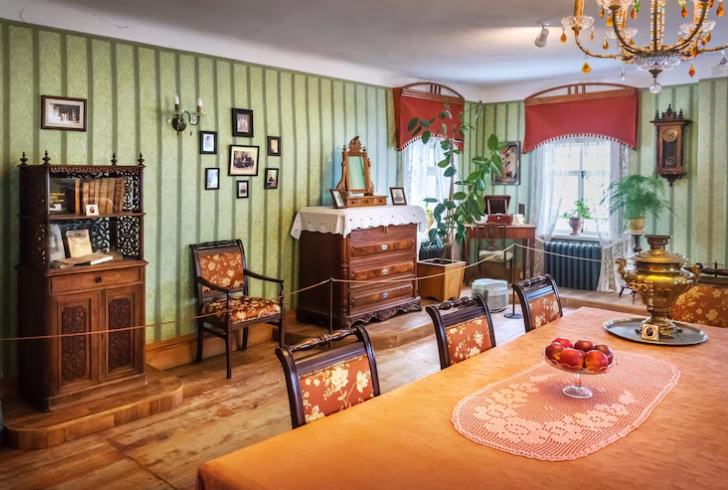Estate sales offer more than secondhand shopping—they create opportunities to discover standout pieces, score unbeatable deals, and get a sneak peek into beautifully curated homes. Unlike a typical garage sale, these events feel like walking through a live showroom where nearly everything has a price tag. From vintage barware to luxury handbags, the possibilities feel endless.
Attending one opens the door to unique finds not on store shelves. Each visit comes with the excitement of the unknown and the potential to bring home something unforgettable.
With the right approach and a few expert tips, shopping estate sales becomes not just rewarding—but seriously addicting.
What Defines an Estate Sale?
An estate sale is organized to sell off the belongings of an entire household—often due to a major life event like downsizing, relocation, or passing. These sales typically take place over a weekend, with companies managing the process and pricing.

Instagram | @yulenochekk | Estate sales invite you to explore full homes filled with unique finds and personal stories.
Shoppers walk through the home, room by room, browsing everything from clothing and furniture to books, decor, and kitchen items. To find listings nearby, websites like EstateSales.net allow zip-code searches. Most listings include preview photos, so it’s easy to scout the best spots before heading out.
Estate Sale Tips for Beginners
Knowing what to expect makes the experience smoother. These essential tips help maximize success, especially for those new to the scene.
1. Plan for Crowds at Hot Sales
When a sale includes high-end pieces or buzzworthy items, foot traffic surges. On popular days, shoppers often arrive early. Some sales use a sign-in sheet at the front door—always check for one before joining a line. Adding a name early ensures faster access and saves time.
2. Carry Cash for Convenience
While many sales accept cards, some charge small processing fees. Cash keeps transactions simple and helps avoid unnecessary charges. Bringing small bills also makes haggling easier when allowed.
3. Prepare for Big Item Buys
Larger finds—like a retro credenza or vintage armchair—require planning. Bring a tape measure, know the room dimensions at home, and double-check car space for transport. Marking items as “sold” helps secure them until pickup, and sale staff often provide tags for this purpose. Most sales allow buyers until the end of the weekend to remove large items.
4. Follow Basic Shopping Etiquette
Respect is key in shared sale spaces. Hosts often post house rules at the entrance, so be sure to follow them. Basic courtesies include: no food or drinks inside, keep pathways clear, be polite to staff and others, and avoid touching items that are marked or already sold.
It’s also helpful to know that estate sales typically do not offer public restrooms—something to keep in mind before arriving with a morning coffee in hand.
How Pricing Usually Works
Estate sale pricing depends on the value and day of the event. Luxury goods may reflect boutique resale pricing, while everyday items resemble thrift store tags.
Pricing generally follows this pattern:
1. Friday: Full price
2. Saturday: Usually 25% off
3. Sunday: Often 50% off
Early birds get the best selection, but latecomers land the lowest prices. Those seeking rare or brand-name items should go on the first day. Bargain hunters might score more on the final day if the item hasn’t sold yet.
Know What’s Off Limits
Not everything on display is fair game. Items with a “sold” sticker belong to another buyer and shouldn’t be touched. Some sales also have a hold table for guests who've claimed items but don’t want to carry them. It's key to respect those boundaries.
While many sales don't allow negotiating, some leave room for discussion. If that’s the case, speaking with staff politely could unlock better deals. Asking questions about the home or item history often leads to interesting stories and buying confidence.
Shop Frequently to Learn the Landscape
No two estate sales feel the same. Some take place in upscale neighborhoods with designer brands, while others focus on smaller, more practical goods. Attending regularly helps buyers recognize patterns in pricing, style, and sale quality.
To save time:
1. Preview sales online
2. Identify reliable companies or organizers
3. Follow them on social platforms for early updates
4. Learn which neighborhoods offer upscale selections
While every sale won’t be a goldmine, consistency pays off. Frequent visits increase the chances of discovering items that truly stand out.
Real Finds, Real Value

Freepik | VisualCreative1 | Estate sales offer real value with rare finds and everyday treasures waiting to be discovered.
Shoppers often come across finds that surprise even seasoned collectors—hand-painted china, vintage light fixtures, or a first-edition book. High-end discoveries are always possible, especially in cities where estate sales pop up in historic or luxury homes.
Even those looking for practical items—cleaning supplies, basic kitchen gear, or home office tools—walk away with useful bargains. Many items at these sales have hardly been used, yet cost far less than retail.
Decorators, collectors, and bargain lovers alike find estate sales hard to resist. One day, it’s a set of vintage glassware for the bar cart. Next time, it’s a mid-century chair that becomes the living room centerpiece.
The Unexpected Joy in Secondhand Shopping
Shopping estate sales is more than just scoring bargains—it’s the thrill of discovery and finding unique, charming items with character. With patience, a keen eye, and a bit of strategy, estate sales become rewarding treasure hunts filled with surprises, stories, and unforgettable finds.
While not every visit leads to a big haul, the experience combines fun, savings, and sustainability, making it a fulfilling pastime. By planning smart, shopping often, and keeping an open mind, you never know when the perfect find will appear.




